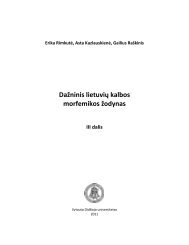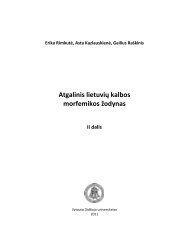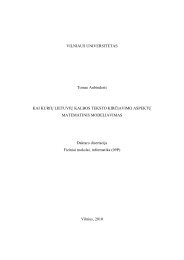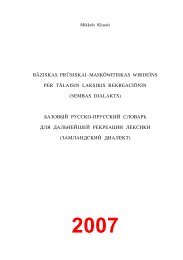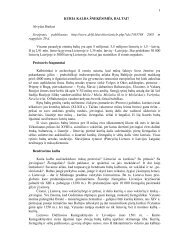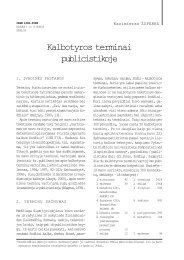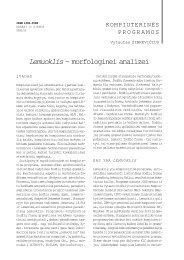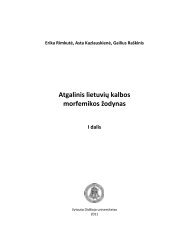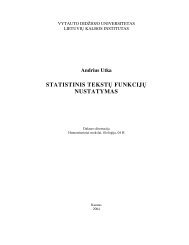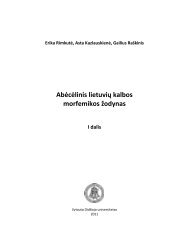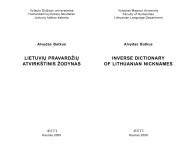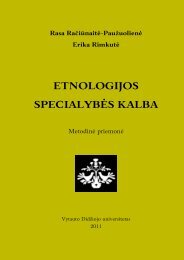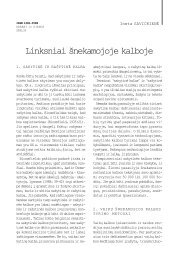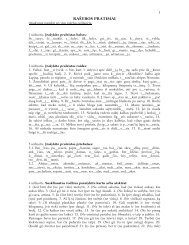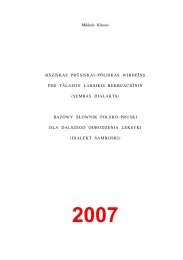HISTORICAL GRAMMAR OF OLD PRUSSIAN
HISTORICAL GRAMMAR OF OLD PRUSSIAN
HISTORICAL GRAMMAR OF OLD PRUSSIAN
You also want an ePaper? Increase the reach of your titles
YUMPU automatically turns print PDFs into web optimized ePapers that Google loves.
<strong>HISTORICAL</strong> <strong>GRAMMAR</strong> <strong>OF</strong> <strong>OLD</strong> <strong>PRUSSIAN</strong><br />
‘feather-bed’ (PEÞ III 292), sompisinis (E) ‘bread of coarse-ground flour’<br />
(PEÞ IV 140) etc19 .<br />
There are also derivatives with a suffix *-în in Prussian, e.g.: adj.<br />
alkîns (III) ‘hungry’ (PEÞ I 66), subst. acc. sg. kaimînan (III) ‘neighbour’<br />
(PEÞ II 75 f.), subst. seimîns (III) ‘family’ (PEÞ IV 93).<br />
* 57. Pr. suf. -ain- and -ein- were used to derive adjectives and<br />
substantivized adjectives, e.g.: deynayno (E) ‘morning star’ = *deinain¯É<br />
< adj. (fem.) *deinain` ‘daily’ (PEÞ I 188), g[elta]ynan (E galatynan)<br />
adv. ‘yellow’ = *geltainan (PEÞ I 344 f.), s[u]weynis (E seweynis) ‘piggery’<br />
= *suvein- (PEÞ IV 103 f., cf. Ambrazas DDR II 57), adv. angstainai<br />
(III) ‘early’ and angsteina ‘idem’ (PEÞ I 78 f.).<br />
Note: The Germans (resp. Germanized Prussians) could confuse<br />
spellings -ain- and -ein- in Prussian texts (especially in Catechisms).<br />
* 58. Suf. -ûn was used to form substantives from verbs and (substantivized)<br />
adjectives, cf. Pr. acc. maldûnin ‘youth’ < Pr. adj. *maldûna-<br />
‘youthful’ (PEÞ III 104 f.), Pr. percunis (E) ‘thunder’ < Balt. adj. masc.<br />
*perkûnas ‘related to *perkus “oak-tree” ’ (PEÞ III 265), Pr. alkunis (E)<br />
‘elbow’ = *alkûnis < Balt. adj. *alkûna-/*elkûna- ‘having a bend’ (PEÞ I<br />
67 f.), Pr. waldûns (pl. weldûnai) (III) ‘inheritor’ < Pr. *veldûnas ‘idem’ <<br />
Pr. *veld- ‘inherit’ (PEÞ IV 229), Pr. malunis (E) ‘mill’ < Pr. *malûnas<br />
‘idem’ < Polish m_ lyn + Pr. *mal- ‘to mill’ (PEÞ III 107 f.) 20 .<br />
a borrowing from Prussian because of irregular correspondence of tone in Pr. k`ima(luke) ‘visits’<br />
(= Pr. caymis E = acute *kaým(a)s, not circumflex o coymis! – see * 4 and ftn. 2) vs. Lith. acute<br />
k³imas ‘village’ (not cirkumflex as in ki…emas = Latv. cÑems, i.e. not o kaµmas!). As for the said<br />
“centum” exception in general, it may have been not an exception but a result of borrowing from<br />
Germanic (cf. Gothic above) into Baltic.<br />
Nevertheless some nouns, derived with a suf. -in, seem to be of archaic Baltic-Slavic origin,<br />
e.g. part of those which mark male animals in respect to basic feminine appellative, cf. Pr. (E)<br />
masc. awins ‘ram’, Lith. masc. ãvinas ‘idem’, Latv. masc. $uns ‘idem’, OSl. ovünú ‘idem’ vs. Lith.<br />
fem. avÑs ‘sheep’, OLatv. fem. avs ‘idem’, OSl. “dimin.” ovü-ca ‘idem’. – L.P.<br />
20 Such words as Pr. waldûns (III) show that suf. *-ûn was still productive in Prussian, in spite<br />
of earlier derivatives of Common Baltic past, as e.g. Pr. percunis (E) – cf. Lith. perk«nas, Latv.<br />
dial. p@&çrk°uns, or Pr. alkunis (E) – cf. Lith. alk«në, Latv. ‡elkuonis @ – L.P.<br />
31



